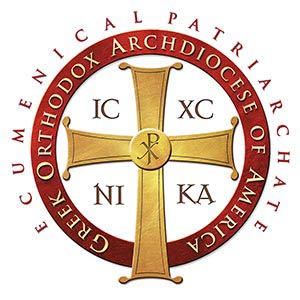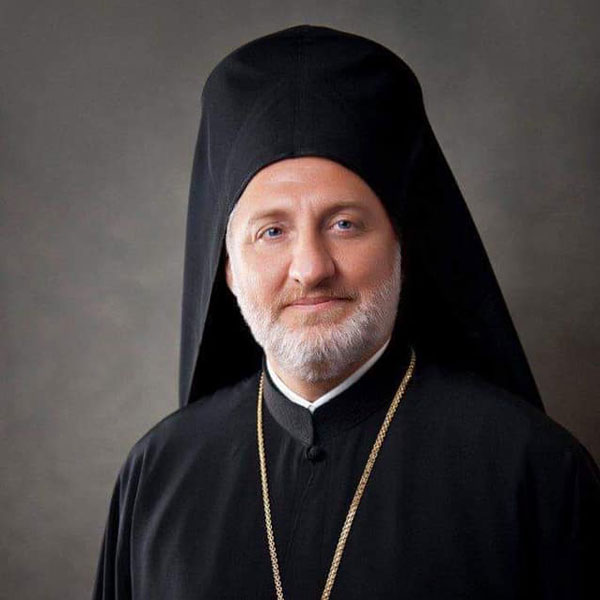ON JUNE 22, 2019 HIS EMINENCE ELPIDOPHOROS WILL BE INSTALLED AS ARCHBISHOP OF AMERICA AT THE CATHEDRAL OF THE HOLY TRINITY IN MANHATTAN. ALL FAITHFUL ARE ENCOURAGED TO ATTEND.
THERE WILL BE A RECEPTION FOLLOWING AT THE NY HILTON HOTEL. WE HAVE BEEN ASKED TO BUY A TABLE FOR TEN COSTING $2,500. EACH TICKET COSTS $250. ALL MONIES WILL GO TOWARD THE RESTORATION OF THE ST. NICHOLAS SHRINE AT THE WORLD TRADE CENTER.
WE ARE EXTENDING THE DEADLINE FOR JOURNAL ENTRIES SINCE WE ARE STILL RECEIVING THEM. THANK YOU FOR YOUR INTEREST AND BLESSINGS!
THE GREEK DANCE CLASS ON WEDNESDAY HAS CONCLUDED FOR THE SUMMER AND WILL RESUME ON SPETEMBER 4, 2019.
BIBLE STUDY ON THURSDAY WILL BE IN SESSION DURING MOST OF THE SUMMER. PLEASE CALL THE CHURCH OR ASK ANYONE AT THE CANDLE STAND FOR INFORMATION.
IF YOU HAVE NOT SENT IN THIS YEAR'S STEWARDSHIP PLEASE DO THAT TODAY.
THANK YOU FOR YOUR GENEROSITY!
________________________________
ON THE SOUL!
CHRISTOS ANESTI!
During the first few centuries after our Lord and God's Death and Resurrection many gifted orators and theologians tried to articulate and understand the implications of that very historic event. Most of which were philosophers and teachers who tried a synchronistic approach with existing religions and philosophies generally delivered by pagan thought but more intentionally toward Judaism. What intrigued many was the state of the soul in relationship to Jesus Christ and God the Father. Did anything changed with His life-ending event or is it the same as before?
One of these philosophers during the second century is Justine Martyr who I have quoted in the past. Here is a wonderful presentation by the "The Conditional Immortality Association of New Zealand," based on Justin Martyr's understanding and conversion to Christianity and the Immortality of the Soul.
"Justin (AD 110-165) came from a Greek-speaking Gentile family living in Flavia Neapolis, Biblical Shechem, in Samaria. This was near Jacob’s Well where Jesus offered another non-Jewish seeker the 'living water' of eternal life, the abundant life that comes only through faith in Jesus Christ as Saviour (John 4:10, 14). A well educated, well travelled young man, searching for truth, Justin attached himself to a succession of philosophical schools, finally content to be called a follower of Plato. That was until (about AD 130) he met an old man while walking along the seashore. This unknown man of faith pointed out to Justin some weaknesses in his Platonic system. He showed him how the Old Testament predicted the coming of Christ. Seeing the courage of the martyrs in facing death, Justin was convinced. Justin drank for himself from the water of life. Still content to wear his philosopher’s cloak as a token of his belief that Christianity was the 'true philosophy', he dedicated the rest of his life to explaining Christianity to the Greeks and the Romans and defending the faith against its intellectual opponents."
Furthermore, Justin listens intently to the old man's understanding of the immortality of the soul, and this is where we continue with the dialogue from "The Conditional Immortality Association of New Zealand."
"I now want to look more closely at what Justin says on matters related to Conditional Immortality and turn first to his view of the immortality of the soul (or lack thereof). From the account of the death of Socrates, Plato derived his firm conviction as to the immortality of the human soul, which he passed on to his followers. In his Dialogue with Trypho, Justin records a conversation with an 'old man' leading up to his conversion to Christianity. Even after his conversion, Justin was influenced by his philosophical background, particularly by the teachings of Plato and the Stoics. As a result, Justin continues to believe in the separable existence of the soul and that the soul is conscious between death and the resurrection (More about this latter). Now, in relating his discourse with this unnamed Christian mentioned above, Justin tells us that the old man asked if the soul was divine and immortal. Justin’s immediate answer, reflecting his background, is, 'Assuredly'.
The old man then laid out his argument to show that the soul is not in its own nature immortal. His argument is so convincing that Justin is driven to conclude that the soul cannot be immortal by nature. Justin quotes the old man at length. His words are recorded thus:
'Now the soul partakes of life, since God wills it to live. Thus, then, it will not even partake [of life] when God does not will it to live. For to live is not its [the soul’s] attribute, as it is God’s; but as a man does not live always, and the soul is not for ever conjoined with the body, since, whenever this harmony must be broken up, the soul leaves the body, and the man exists no longer; even so, whenever the soul must cease to exist, the spirit of life is removed from it, and there is no more soul, but it goes back to the place from whence it was taken.'
Here, the unnamed Christian says that the soul is not immortal but that it lives only as long as God wills it to live. He speaks of the disconnection of soul and body as causing the man to cease to exist. He also speaks of the soul ceasing to exist. This is conditional immortality.
Justin relates this conversation as it took place, without making any comment on the old man’s words. It seems to me that what the old man believed, what we call conditional immortality, was not in any way remarkable to Justin the Christian, though it was a 'revelation' to Justin the unconverted philosopher. That is to say, Justin did not consider the old man’s words so out of order or 'heretical' from his latter perspective as an 'orthodox' Christian as to require further comment. What Justin himself thought will be gathered from elsewhere in the Dialogue and in the Apologies, but for now I am content to put forward that this conversation suggests that belief in conditional immortality (or at least belief in the natural mortality of the human soul) must have been wide spread among Christians in Justin’s day, else Justin would surely have remarked that the old man was so out of step with his contemporaries."
Finally, what do you think about Justin's and early Christians understanding about the immortality of the soul? Is it conditional or a natural phenomenon? Think about it. AMEN!


 Today, May 16, 2019, His Eminence Archbishop Elpidophoros of America held a teleconference call with the Hierarchs and clergy – active and retired, of the Holy Archdiocese of America. The call was organized by Metropolitan Methodios of Boston in his capacity as Archiepiscopal Vicar, with the cooperation of the Archdiocesan Presbyters Council. Over 400 clergy participated in the call.
Today, May 16, 2019, His Eminence Archbishop Elpidophoros of America held a teleconference call with the Hierarchs and clergy – active and retired, of the Holy Archdiocese of America. The call was organized by Metropolitan Methodios of Boston in his capacity as Archiepiscopal Vicar, with the cooperation of the Archdiocesan Presbyters Council. Over 400 clergy participated in the call.
 Even though I am, as the Apostle Paul once said, “absent in the body” from you, I am very much with you in heart, in mind, and in spirit (cf. I Cor. 5:3). I wanted to take this moment to communicate with you through this marvelous tool of social media, to express how much I desire to embrace all of you as spiritual children, and to manifest to you the love with which God has graced my heart for the precious flock of the Holy Archdiocese of America.
Even though I am, as the Apostle Paul once said, “absent in the body” from you, I am very much with you in heart, in mind, and in spirit (cf. I Cor. 5:3). I wanted to take this moment to communicate with you through this marvelous tool of social media, to express how much I desire to embrace all of you as spiritual children, and to manifest to you the love with which God has graced my heart for the precious flock of the Holy Archdiocese of America.